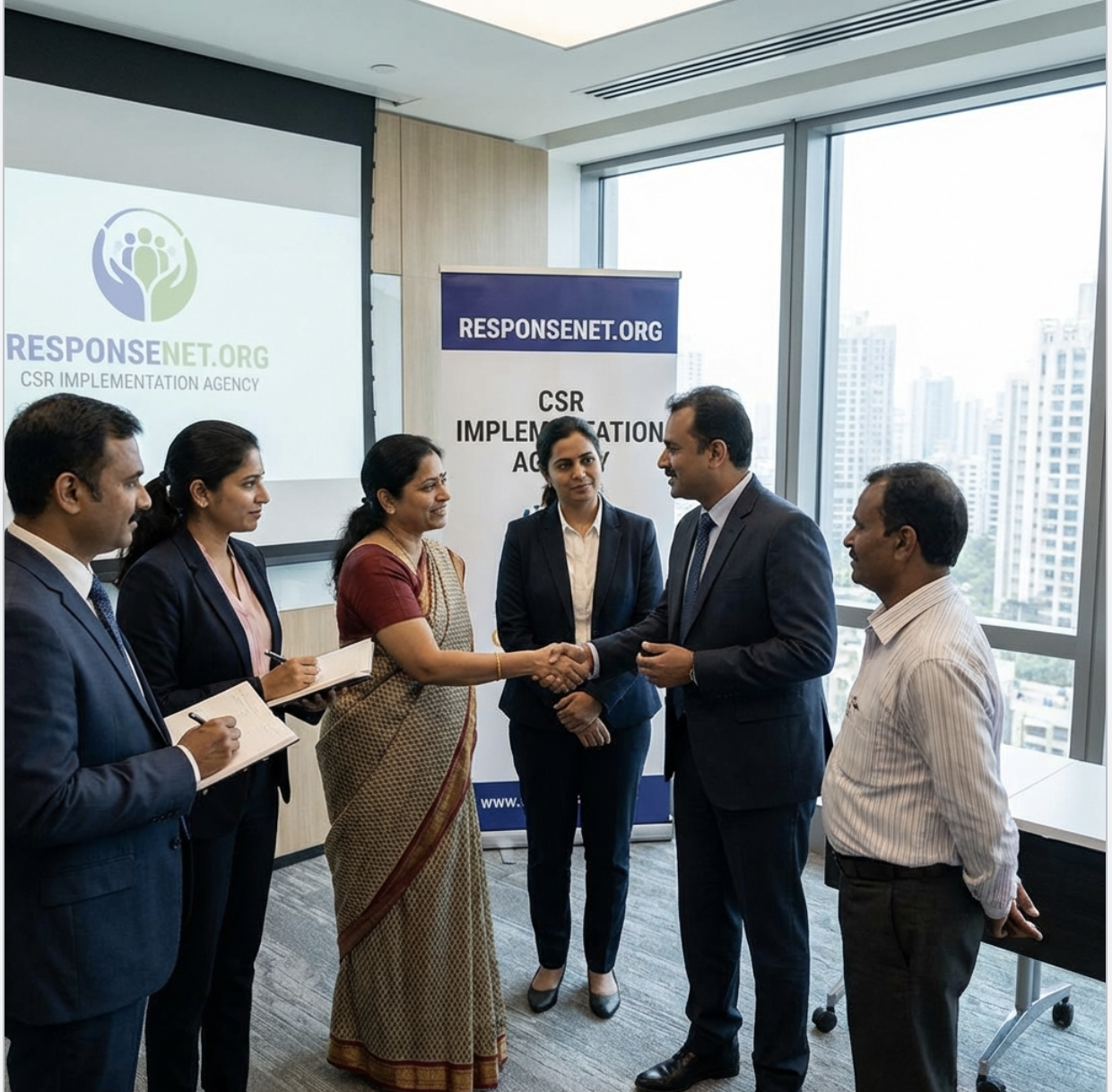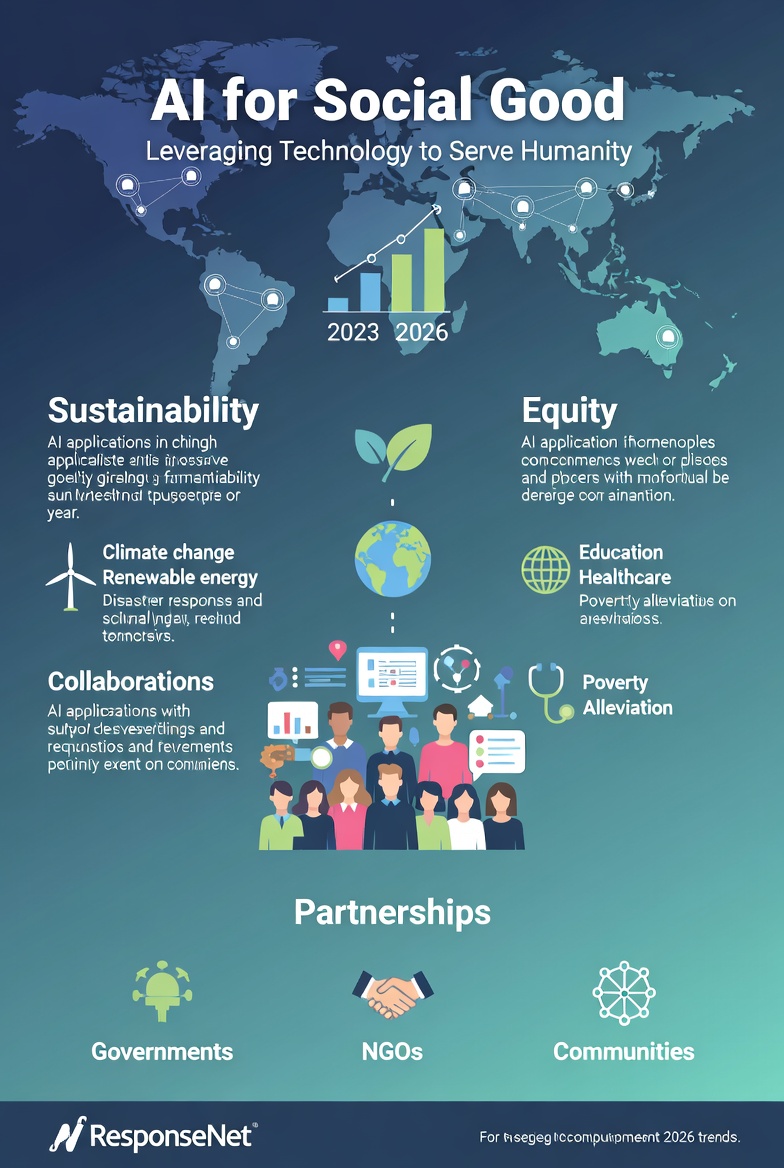Since 2007, delivering scalable, community-centric solutions across 24 states and UT.

Trusted by corporations, nonprofits, and communities across India to deliver measurable social impact
















































































































































Our Impact in Action
Section 1 of 10 • Showcasing transformative CSR initiatives






Measurable Social Impact
Trusted by leading corporates. Powered by community-first execution.
Expanding Impact Across India
Delivering scalable impact across 24 states and UT
Holistic Community Development
Our end-to-end solutions—policy design, project execution, and impact assessment—turn your CSR funds into transformative outcomes for communities across India.


Partner with Responsenet for CSR Impact
Since 2007, Responsenet, a Section 8 not-for-profit, has driven community-centric CSR solutions across 24 states and UT, delivering scalable, sustainable impact aligned with Schedule VII, Section 135 of the Companies Act 2013.
Why Partner with Responsenet?
Grassroots Expertise: Designing localized interventions in financial inclusion, women's empowerment, skill development, and humanitarian aid.
Nationwide Reach: Impacting millions across states like Delhi, Maharashtra, Uttar Pradesh, Karnataka, and more.
Strategic Partnerships: Collaborating with corporates, governments, and nonprofits to maximize social return on investment (SROI).
Measurable Outcomes: Delivering transparent, data-driven results that strengthen communities and align with your CSR goals.
Our Impact Areas
- Financial Literacy & Inclusion
- Women's Empowerment
- Skill & Livelihood Development
- Humanitarian Aid & Disaster Relief
- Rural Economic Strengthening
- Education
Your CSR Advantage
By partnering with Responsenet, your CSR investments fuel innovative, sustainable programs that build resilient communities and drive transformative change.
Join us: [email protected]CSR PROJECT IMPLEMENTING NGO
Amplify Your CSR Impact with ResponseNet: Leading NGO for Sustainable Development in India
As corporate social responsibility (CSR) evolves into a strategic imperative, ResponseNet—a Section 8 not-for-profit since 2007—converts CSR funds into tangible, enduring impact across 24 states and UT, in full compliance with Schedule VII and Section 135 of the Companies Act 2013. With India's CSR expenditure reaching approximately ₹30,000 crore in FY 2024-25, up from ₹29,000 crore the previous year, partnering with proven NGOs like ResponseNet maximizes efficiency and alignment with ESG goals.
Why Partner with ResponseNet?
- •Targeted Expertise: Specializing in financial inclusion, digital literacy, skill development, and women's economic empowerment—sectors attracting over ₹3,500 crore in CSR funds annually by 2027.
- •Nationwide Scale: Achieving data-driven results in key states including Delhi, Maharashtra, Karnataka, Uttar Pradesh, and others, where Maharashtra leads CSR spends at over ₹5 billion.
- •Cross-Sector Collaboration: Teaming with CSR frontrunners to enhance social return on investment (SROI) via innovative, scalable programs.
- •Compliance & Transparency: Guaranteeing regulatory adherence with detailed, impactful reporting to support BRSR requirements.
Key Impact Areas
- •Financial & Digital Literacy: Bridging access gaps through training, aligning with fintech-driven inclusion initiatives.
- •Women's Economic Empowerment: Supporting entrepreneurship via SHGs and schemes like Lakhpati Didi and SHE Marts, empowering millions as per Budget 2026.
- •Skill & Livelihood Development: Vocational programs in green jobs, leveraging potential tax exemptions for CSR skilling investments.
- •Community Resilience: Strengthening infrastructure and disaster readiness in vulnerable areas.
CSR Trends in India for 2026: Strategic Insights for Practitioners
- •CSR in 2026 emphasizes agility, authenticity, and ESG integration, with total spending projected to grow 10-15% amid regulatory enhancements.
- •ESG and SDG Alignment: Over 80% of firms integrate CSR with ESG, focusing on climate action and skills, with MSDE budget up 62% to ₹9,886 crore.
- •Women's Empowerment Surge: Initiatives like SHE Marts and scholarships target gender equity, with CSR aiding 150,000+ women in micro-entrepreneurship.
- •Skilling and Vocational Focus: Tax incentives for CSR in training could boost private investment, addressing scholarship demands spiking in 2026.
- •Public-Private Partnerships: Emphasis on hyper-local, tech-enabled projects for measurable outcomes.
- •Sustainability Priorities: Environment and health sectors to see ₹3,000-7,000 crore inflows, supporting net-zero by 2070.
FAQs: Essential Queries for CSR Leaders and Investors
- •What are key CSR trends in India for 2026? Agility, ESG alignment, and tech integration dominate, with spends on skills and women's programs rising amid Budget 2026 reforms.
- •How does ResponseNet ensure CSR compliance? Through Schedule VII-aligned projects, transparent SROI reporting, and full adherence to Section 135 mandates.
- •What CSR initiatives empower women in India? Programs like SHGs, financial literacy, and SHE Marts, with CSR enabling economic independence for rural women.
- •How to measure SROI in skill development CSR? Via employment metrics, income growth, and impact assessments; ResponseNet delivers data-backed insights.
- •What tax benefits for CSR in 2026? Potential income tax exemptions for vocational training deployments, encouraging private skilling investments.
Recommendations for Optimizing CSR Investments
- •Align with Budget 2026: Prioritize skilling and women's schemes for tax advantages.
- •Focus on High-Impact Sectors: Invest in underserved areas like environment and livelihoods for better SROI.
- •Adopt Tech Tools: Use AI for program monitoring and employee volunteering.
- •Build Collaborative Models: Partner with NGOs for scalable, local execution.
- •Prepare for Scholarship Demand: Plan early for education aids amid 2026 surges.
- •Enhance Transparency: Standardize reporting for stakeholder trust.
Partner with ResponseNet for Transformative CSR
- •CSR practitioners, investors, and corporate leaders: Elevate your impact through customized partnerships. Reach out to explore funding, co-creation, or investment opportunities for a resilient India.
- •Write to us: [email protected] | Follow on X: @Responsenetorg | Visit: www.responsenet.org
Start the conversation:
[email protected]CO-CREATE IMPACT
Co-Create Lasting CSR Impact with ResponseNet: Empowering Communities Through Participatory Solutions in India
As India's CSR landscape matures into 2026, ResponseNet—a Section 8 not-for-profit—empowers communities via human-centered, participatory approaches that yield sustainable, compliance-aligned impact nationwide. With annual CSR spends projected at ₹29,000–30,000 crore, yet over 60% concentrated in education and health, partnering with agile NGOs like ResponseNet bridges gaps in climate resilience, skilling, and inclusion, aligning with ESG and SDG goals.
Why Partner with ResponseNet?
- •Community-Driven Approach: Co-designing solutions with locals for ownership and enduring impact, emphasizing hyper-local interventions as per 2026 trends.
- •Key Focus Areas: Expertise in financial inclusion, education, WASH (Water, Sanitation, Hygiene), skill development, and livelihood enhancement—sectors forecasted to attract ₹4,300 crore in skill development by 2026.
- •Scalable Impact: Mobilizing stakeholders across 24 states and UT for measurable outcomes, leveraging public-private partnerships for broader reach.
- •Transparent Results: Providing data-driven reports and SROI assessments to meet CSR objectives, with real-time tracking as highlighted in evolving frameworks.
Key Priorities
- •Regulatory Compliance with Schedule VII and Section 135: Ensuring seamless alignment amid stricter enforcement.
- •Measurable Impact with Clear SROI Metrics: Focusing on outcomes over outputs for authentic value.
- •Transparency & Detailed Reporting: Standardizing impact documentation for stakeholder trust.
- •Scalability & Sustainability: Building resilient, long-term programs integrated with net-zero goals by 2070.
CSR Trends in India for 2026: Insights for Co-Creation
- •2026 marks a shift to agility, authenticity, and ESG integration, with spends growing 8-10% annually and emphasis on climate action, tech analytics, and collaborations.
- •Employee-Led and Local Focus: Rising employee-driven initiatives and hyper-local projects to attract talent.
- •Climate and Sustainability Surge: Environment spends to ₹4,200 crore, addressing gaps in resilience and green jobs.
- •Tech and Data Integration: AI for impact measurement and program efficiency.
- •Scholarship and Skilling Boom: Massive demand for financial aid, with skills budget up in Union Budget 2026-27.
- •Collaborative Models: Partnerships with NGOs, startups, and governments for holistic rural development.
FAQs: For CSR Practitioners, Investors, and Leaders
- •What are emerging CSR trends in India for 2026? Agility, ESG alignment, climate focus, and tech-driven authenticity, with 8-10% spend growth and shifts to underserved sectors.
- •How does ResponseNet support community-driven CSR? Through participatory co-creation, ensuring relevance and sustainability in focus areas like WASH and livelihoods.
- •What role does CSR play in climate action in India? Directing funds to resilience and net-zero, with 2026 projections at ₹4,200 crore for environment.
- •How to achieve measurable SROI in CSR partnerships? Via data analytics, transparent reporting, and outcome-focused metrics; ResponseNet excels here.
- •What incentives in Budget 2026-27 for CSR? Investments in skills, human capital, and green initiatives, boosting collaborative efforts.
Recommendations for Co-Creating CSR Impact
- •Embrace Participatory Design: Involve communities early for ownership.
- •Integrate Tech Tools: Use AI for scalable, data-backed programs.
- •Prioritize Underserved Areas: Focus on climate, WASH, and green skilling.
- •Foster Partnerships: Collaborate for broader, sustainable reach.
- •Plan for Scholarship Surge: Address 2026 education aid demands proactively.
- •Embed ESG Principles: Align with SDGs for long-term value.
Call to Action: Co-Create with ResponseNet for Sustainable Change
- •CSR practitioners, investors, and corporates: Let's partner to co-design impactful, participatory projects. Contact us for tailored collaborations, funding discussions, or ESG integrations.
- •Write to us: [email protected] | Follow on X: @Responsenetorg | Visit: www.responsenet.org
Let's collaborate:
[email protected]PARTNERSHIPS FOR DEVELOPMENT
Strategic CSR Partnerships for Sustainable Impact: Collaborate with ResponseNet for Development in India
In 2026, as India's CSR ecosystem matures with annual spends projected at ₹29,000-30,000 crore and a focus on agility, authenticity, and ESG integration, ResponseNet—a Section 8 not-for-profit with over 18 years of experience—fosters strategic partnerships that drive sustainable development across 24 states and UT, fully compliant with Schedule VII and Section 135 of the Companies Act 2013. We align corporate missions with community needs for measurable outcomes in underserved sectors like climate resilience and green skilling.
Why Partner with ResponseNet?
- •Aligned Objectives: Co-creating goals that sync your corporate vision with local priorities, leveraging 2026 trends in employee-led and hyper-local initiatives.
- •Defined Roles & Resources: Clear accountability and efficient allocation to maximize impact, supported by public-private models.
- •Nationwide Expertise: Scalable operations in 24 states and UT, addressing gaps in environment and skills where spends are rising to ₹4,200 crore by 2026.
- •Transparent Collaboration: Regular reports and meetings build trust, aligning with demands for data-driven authenticity.
Our Partnership Approach
- •Needs-Based Solutions for Relevant, Sustainable Programs: Tailored interventions rooted in community insights for long-term resilience.
- •Scalable Impact through Cross-Sector Expertise: Harnessing collaborations for broader SDG alignment.
- •Data-Driven Results with Transparent Monitoring: Real-time tracking and SROI metrics to ensure accountability.
CSR Partnership Trends in India for 2026: Fostering Collaborative Growth
- •With CSR projected to reach ₹35,000 crore in FY 2025-26 and treble to ₹1.2 lakh crore annually by 2035, partnerships emphasize integrated models, tech integration, and underserved areas like climate action.
- •Public-Private-NGO Synergies: Rising focus on place-based rural development, as seen in initiatives like SBI Sammaan.
- •ESG and SDG Integration: Over 80% of firms link CSR to ESG, prioritizing green jobs and sustainability.
- •Tech-Enabled Collaborations: AI reshapes program design, with skills-based volunteering hitting 31% participation.
- •Scholarship and Skilling Focus: Surge in education aid, with skill spends at ₹4,300 crore.
- •Outcome-Oriented Alliances: Shift from compliance to commitment via strategic advisory and multi-year engagements.
FAQs: Insights for CSR Practitioners and Investors
- •What are key CSR partnership trends in India for 2026? Emphasis on agile, authentic collaborations with NGOs for ESG-aligned, hyper-local impact, amid 8-10% spend growth.
- •How does ResponseNet facilitate strategic CSR partnerships? Through co-creation, clear roles, and data monitoring for scalable, needs-based solutions.
- •What benefits do NGOs bring to CSR partnerships? Expertise in grassroots implementation, community trust, and impact measurement, as per advisory models.
- •How to ensure transparent CSR collaborations? Via regular reporting, SROI metrics, and stakeholder engagement for accountability.
- •What sectors are ideal for CSR partnerships in 2026? Climate resilience, skilling, and rural development, with funding gaps offering high-impact opportunities.
Recommendations for Building Effective CSR Partnerships
- •Align with Trends: Prioritize ESG-integrated, tech-enabled models for authenticity.
- •Focus on Collaboration: Engage NGOs early for community-driven designs.
- •Emphasize Metrics: Use data tools for transparent, outcome-focused monitoring.
- •Scale Strategically: Start local, expand nationwide for sustainable impact.
- •Prepare for Surges: Address scholarship demands and green job skilling proactively.
- •Foster Trust: Define roles and resources upfront for efficient alliances.
Call to Action: Forge Partnerships with ResponseNet for Enduring Development
- •CSR leaders, investors, and corporates: Partner with us to co-create strategic, impactful initiatives. Reach out for discussions on collaborations, funding, or ESG-aligned projects.
- •Write to us: [email protected] | Follow on X: @Responsenetorg | Visit: www.responsenet.org
Let's build impactful partnerships:
[email protected]Implementation Impact
Explore our latest stories, field updates, and insights on community development and CSR impact across India.

Strategic CSR Initiatives for Economic Empowerment Through Sectoral Skill Development
Bridging India's Industry Skill Gaps Strategic CSR Initiatives for Economic Empowerment Through Sectoral Skill Development NEED CSR CONSULTATION? Get expert guidance on CSR strategy, compliance, and impact measurement from ResponeNet’s specialists. 📧 [email protected]📞 +91 9810007524 📊 India Skill Gap Analysis Dashboard 2024-25 Comprehensive analysis based on latest government and industry reports 51.25% Youth Employability 60-73% ...

Support Life-Changing Initiatives & Save Tax with Responsenet
Support Life-Changing Initiatives & Save Tax with Responsenet Your Donation. Their Future. Your Tax Savings. Empower communities across India while benefiting from 80G tax exemption. Your contributions to Responsenet directly impact children, women, and marginalized communities, providing education, financial literacy, and livelihood opportunities. Why Donate to Responsenet? Responsenet has been at the forefront of social ...

Artificial Intelligence (AI) for Social Good: Building the Future with AI
In a world increasingly dominated by technology, artificial intelligence (AI) stands as a powerful tool that holds immense potential to shape our future. Yet, the narrative surrounding AI often focuses on its potential perils, from job displacement to privacy concerns. This the series, however, seeks to shift that narrative and explore the transformative power of ...

AI in Policy and Governance for Sustainability
AI in Policy and Governance AI in Policy and Governance for Sustainability Artificial Intelligence (AI) has emerged as a revolutionary technology that can transform various sectors, including policy and governance. Its potential to contribute to sustainability efforts is immense, providing innovative solutions to complex social and environmental challenges. AI can play a significant role in ...

AI for Waste Management and enhanced recycling
AI for Waste Management Integrating artificial intelligence (AI) into waste management is reshaping the method we handle and dispose of waste, leading to more efficient and sustainable practices. AI’s potential in this realm is immense, as it can tackle various challenges related to waste management, from waste sorting and collection to recycling and disposal. One ...

AI for Sustainable Urban Planning
AI for Sustainable Urban Planning AI Urban Sustainability Artificial Intelligence (AI) is increasingly becoming a powerful tool in assisting us to address some of the most pressing issues in society today. One of the areas where AI could play a significant role is in promoting urban sustainability. Urban sustainability refers to the ability of cities ...
PARTNERS
Your Support Transforms Lives with Responsenet
At Responsenet, a Section 8 not-for-profit with impact since 2007, your generous support fuels community-led change across 24 states and UT, aligned with Schedule VII, Section 135 of the Companies Act 2013. Every contribution creates lasting, measurable impact.
Why Your Donation Matters
- •Tangible Outcomes: Your support drives programs in education, financial inclusion, women's empowerment, and WASH, uplifting millions.
- •Sustainable Change: We co-create solutions with communities, ensuring long-term resilience and self-reliance.
- •Transparency & Trust: Detailed impact reports show exactly how your donation transforms lives.
- •Amplified Impact: Your contribution maximizes social return on investment (SROI) through strategic partnerships.
Make a Difference Today
Your donation empowers communities to shape their futures. From improving school attendance to strengthening local economies, every rupee counts.
Join us in creating change:
[email protected]Got questions?
Everything you need to know about partnering with Responsenet for impact.
Responsenet is a Section 8 not-for-profit organization established in 2007. We are fully compliant with Schedule VII, Section 135 of the Companies Act 2013, ensuring your CSR investments are regulatory compliant.
We have a nationwide presence, operating across 24 states and Union Territories including Delhi, Maharashtra, Karnataka, Uttar Pradesh, and Assam, allowing for scalable pan-India impact.
We prioritize data-driven transparency. Our projects include rigorous monitoring and evaluation frameworks to calculate Social Return on Investment (SROI) and provide detailed impact reports.
Our key focus areas include Quality Education, Women's Economic Empowerment, Health & Nutrition, Skill Development, and Humanitarian Aid & Disaster Relief.
Absolutely. We specialize in co-creating bespoke CSR initiatives that align with your corporate values and community needs, ensuring long-term sustainability and ownership.
You can reach out to our partnerships team at [email protected]. We will schedule a consultation to understand your CSR goals and propose a tailored strategy.
Partner for Sustainable Change
Join us to make every CSR investment count. Build stronger communities and enhance social impact.

